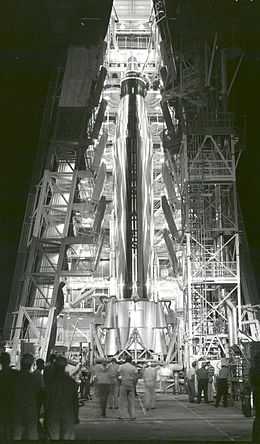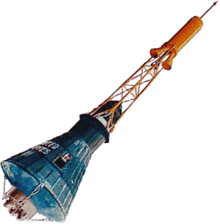Big Joe (Project Mercury)
| Big Joe 1 |
|---|
 Big Joe 1 launch preparations |
Big Joe was a subprogram of America's Project Mercury space program. It comprised a single flight using an Atlas launch vehicle, and a boilerplate Mercury capsule. The purpose of the Big Joe program was to prove the ablative heat shield which would be needed for the re-entry of orbital Mercury missions. The flight, Big Joe 1, occurred on September 9, 1959.[1]
The Big Joe name has been attributed to Maxime Faget at NASA's Langley Research Center in Hampton, Virginia. It was a progression of the smaller test booster Little Joe. Faget also coined the Little Joe name basing it on its four large fins which reminded him a roll of four in craps.[2]
Mission numbering
The official Mercury mission numbering designation was a two-letter designation which corresponded to the launch vehicle type, followed by a dash then a one- or two-character designation of the flight/test number. The official designation for Big Joe 1 was BJ-1.
Atlas launch vehicle numbering
The launch vehicle used for BJ-1 (628/10-D) had a slightly different numbering scheme than those used for the later Mercury-Atlas flights.
See also
Notes
| ||||||||||||||||||||||||||||||||||||||||||||||||||||||||||||||||||
